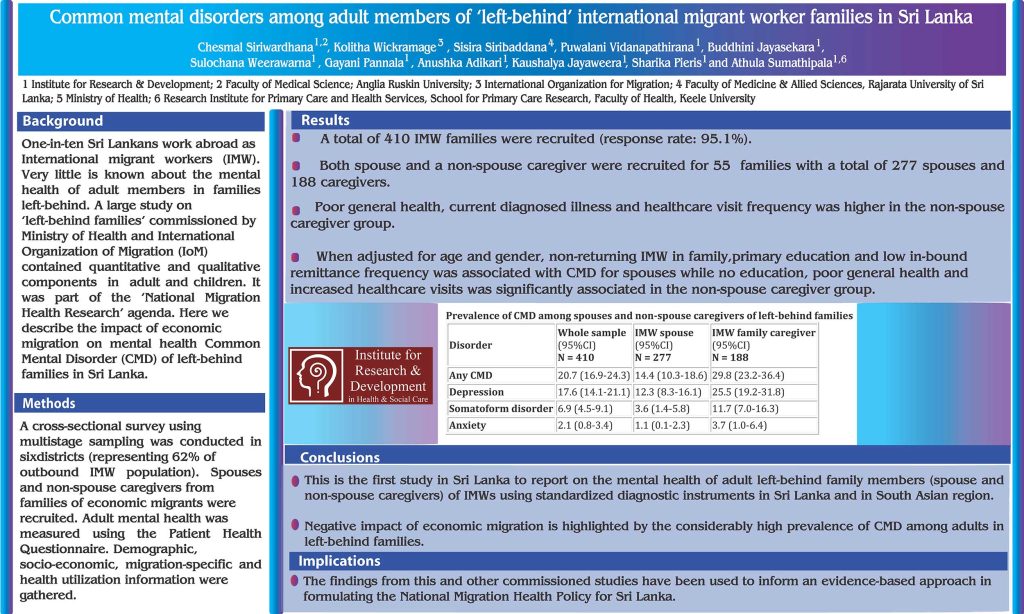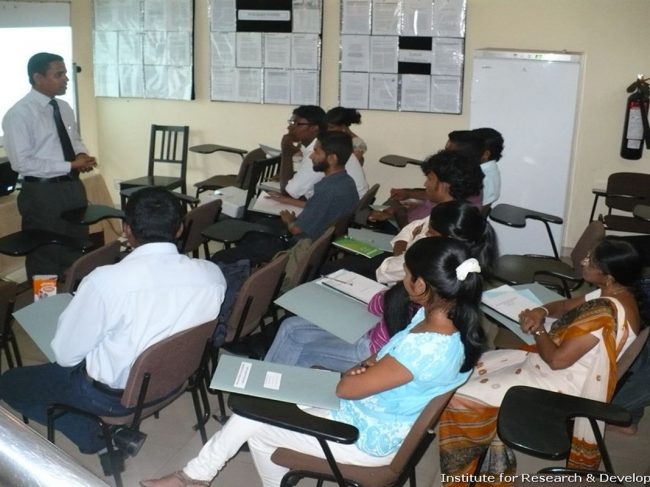
Sri Lanka – Nearly two million Sri Lankans are employed abroad, with remittances contributing to more than 10 per cent of Sri Lanka’s annual GDP. Yet, little data is available on the other side of the coin: the consequences endured by the families who are left behind.
The second National Symposium on Migration Health and Development was held this week, resulting in the draft of the national Coordinated Care Plan. IOM and other key stakeholders met, under the patronage of the Ministry of Health and Indigenous Medicine, to formulate this pioneering policy document which paves a way forward, addressing the issue of caring for the families “left behind” by Sri Lankan migrant workers.
It builds on the work of the first National Symposium in 2011, which yielded Sri Lanka’s National Migration Health Policy, launched in 2013. This was a joint effort by IOM and the government of Sri Lanka and marks a major milestone for IOM’s global work on the health needs of migrant and mobile populations, and for advancing the World Health Assembly resolution on the health of migrants.
A series of three landmark studies, conducted by IOM in collaboration with the Ministry of Health (MoH) and a number of national and international academia and research institutions, yielded surprising findings which was focal to the drafting of the Coordinated Care Plan.
This is the first national-level study to explore mental health outcomes among children and adults who are left behind, through standardized diagnostic instruments. Key findings from these studies show that there are notable mental and emotional implications on families, particularly children. Further, the contribution of elderly caregivers taking on the burden of caring for children left behind takes a significant, but unrecognized, toll on their own health.
Overall, the studies reveal that post-migration periods are of mixed-benefit to families. The absence of guardians has lasting mental health effects on children and the absence of support mechanisms in the event of traumatic events is also an area of major concern. Despite the positive intentions of migrant workers and many benefits that labour migration brings, these studies show that there are significant effects to the health, well-being and the family structures of families left behind.
“The study findings may be relevant for other labor-sending countries that rely on contractual labor migration for economic gain. Balancing economic gain in the context of social and health impacts form a formidable policy challenge for governments whose economies are dependent on remittance earnings,” said IOM Chief of Mission Giuseppe Crocetti.
The Minister of Health and Indigenous Medicine, Dr. Rajitha Senarathne, expressed his commitment to migrant health in his speech which was delivered by his representative: “It is vital that we establish migrant friendly systems and policies within our country. Informed and facilitated migration will make migration more beneficial for migrants, families, and also the society.”
Mr. G. S. Withanage, Secretary of the Ministry of Foreign Employment, told the Symposium that in this regard, “Evidence-based policy formulation is very much needed and the findings from the research studies will be useful for such process.”
More work needs to be done to fully address this issue. Dr. Kolitha Wickramanage, Public Health Specialist, IOM HQ and lead co-author of the study suggested that “undertaking child vulnerability assessments for each prospective migrant worker family and a coordinated care plan to address such factors by relevant health, social welfare, education and child protection officers at district level will be important in minimizing health and social risks.”
IOM and the Ministry of Health also acknowledge the excellent partnership of the Institute for Research and Development (IRD) in undertaking the research and Dr. Chesmal Siriwardhana for his contribution as the principal author.
The study findings showed:
- 2 in 5 children ‘left behind’ were found to be vulnerable to emotional, conduct and hyperactivity issues.
- 30 per cent of children ‘left behind’ were underweight compared with 17.7 per cent of children with parents at home.
- 20.7 per cent of spouses ‘left behind’ experienced depression, anxiety, sleep-related and other such disorders compared to the national prevalence of 13.8 per cent.
- Non-spouse caregivers (often grandmothers) experienced such disorders nearly three times more than the national average.
- The study recommends more support to families when the decision to migrate is being considered and once a parent is abroad to minimize any negative health, social, and economic consequences.
The studies have been published and are available to read in several leading international peer-reviewed medical and public health journals. Free online-access at:
http://www.biomedcentral.com/1471-244X/15/39
http://www.biomedcentral.com/1471-2458/15/299
http://www.ncbi.nlm.nih.gov/pubmed/24242226
IOM UN Migration. (June 2015). Addressing the Health Needs of Families Left Behind by Sri Lankan Migrants. Press Releases. Web Post. Retrieved from https://www.iom.int/news/addressing-health-needs-families-left-behind-sri-lankan-migrants


